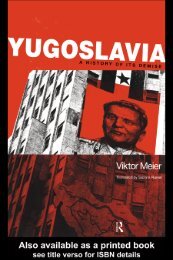Equality, Participation, Transition: Essays in Honour of Branko Horvat
Equality, Participation, Transition: Essays in Honour of Branko Horvat
Equality, Participation, Transition: Essays in Honour of Branko Horvat
Create successful ePaper yourself
Turn your PDF publications into a flip-book with our unique Google optimized e-Paper software.
heavy <strong>in</strong>dustry. In short, two <strong>of</strong> the basic economic decisions, namely<br />
the decision on <strong>in</strong>come distribution and <strong>in</strong>vestment, rema<strong>in</strong>ed under<br />
strict government control, while consumers were to decide what to<br />
produce, and enterprises were to decide how to organize production<br />
and comb<strong>in</strong>e productive factors.<br />
The political system and the policy <strong>of</strong> no social pluralism rema<strong>in</strong>ed<br />
firm. For example, while catastrophic results <strong>in</strong> agriculture compelled<br />
the strategic decision to abandon forced collectivization, the socialist<br />
transformation <strong>of</strong> the countryside as an ultimate aim was not given up.<br />
Only the method was changed – under the Agricultural Land Pool Act <strong>of</strong><br />
1953, the maximum land allowed to <strong>in</strong>dividual peasants was reduced<br />
to ten hectares, and the Constitution Act <strong>of</strong> 1953 proclaimed this restriction<br />
as a constitutional pr<strong>in</strong>ciple. The pr<strong>in</strong>ciple has s<strong>in</strong>ce become the<br />
major obstacle to the development <strong>of</strong> the private agricultural sector.<br />
8.2.3 Market socialism, 1963–73<br />
Jozae Menc<strong>in</strong>ger 123<br />
Market socialism was <strong>in</strong>itiated by the Program <strong>of</strong> the League <strong>of</strong><br />
Communists <strong>of</strong> Yugoslavia <strong>in</strong> 1958, which def<strong>in</strong>ed socialism as:<br />
the social system based on socialized means <strong>of</strong> production <strong>in</strong> which<br />
social production is managed by associated direct producers, <strong>in</strong><br />
which <strong>in</strong>come is distributed accord<strong>in</strong>g to the pr<strong>in</strong>ciple to each<br />
accord<strong>in</strong>g to his work, and <strong>in</strong> which, under the rule <strong>of</strong> the work<strong>in</strong>g<br />
class, itself be<strong>in</strong>g changed as a class, all social relations are gradually<br />
liberated from class antagonisms and all elements <strong>of</strong> exploitation <strong>of</strong><br />
man by man.<br />
(Savez Komunista Jugoslavije 1958: 133)<br />
In fact, the entire systemic development dur<strong>in</strong>g the 1950s and the<br />
1960s was a process <strong>of</strong> permanent reforms. All imag<strong>in</strong>able solutions<br />
were tried, <strong>of</strong>ten <strong>in</strong> a very uncoord<strong>in</strong>ated manner (Caica<strong>in</strong>-Saa<strong>in</strong>, 1985).<br />
Numerous and varied economic <strong>in</strong>struments were used, and each new<br />
economic <strong>in</strong>strument tended to change the given structure and the<br />
system as such. Nevertheless, throughout this period, the economy<br />
was gradually becom<strong>in</strong>g market-based, although neither the labour<br />
nor the capital market were <strong>of</strong>ficially sanctioned, and both rema<strong>in</strong>ed<br />
rudimentary.<br />
Among permanent changes, two reforms, <strong>in</strong> 1961 and <strong>in</strong> 1965,<br />
should be noted as those that decisively reduced central control and<br />
considerably <strong>in</strong>creased the autonomy <strong>of</strong> economic units. In the 1961<br />
reform, wage control was abolished, foreign trade was liberalized and

















